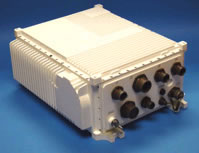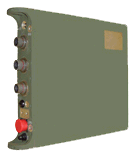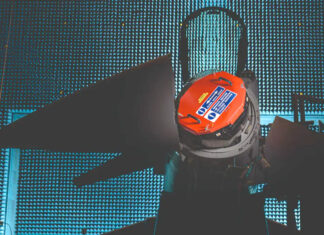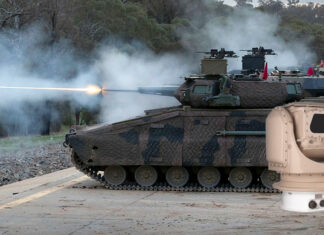DRS Lightweight Scorpion rugged portable notebook computers are designed to operate under extreme conditions. Sealed in a rugged case and keyboard withstanding MIL-SPEC-810, the Scorpion can operate in a temperature range from -20o to +50o C. These computers use internal Commercial Off-The-Shelf (COTS) architecture powered by Pentium III 700 MHz processors, and 128MB DRAM, expandable to 512 MB, and removable hard drive to provide economical upgrading and support. The Scorpion can be expanded utilizing dedicated hardware expansion cards, using two type I/II or one type III PCMCIA ports. The notebook computer uses 12.1″ TFT displaying SVGA (800×600) on a daylight readable screen. The Scorpion can be powered by an AC adapter, standard 28VDC vehicle battery or hot swappable lithium ion batteries. The Scorpion RBM uses standard Windows operating system. The system uses standard interfaces for integration with peripherals and communications devices, including RS-232 serial port, RS-422/RS-485 serial port, two USB ports, parallel port and RJ11 10/100 Ethernet port.
 A different configuration of Scorpion is the Rugged Vehicle Terminal (RVT) is a touch-screen tablet computer with external keyboard capability. The device can be mounted inside a combat vehicle and operate on the move. The RVT can operate from vehicle power or independently, using its internal rechargeable batteries. The RVT can be driven by the Platform Digitization Processor Unit (PDPU), vehicle mounted computer. The PDPU can be used to process navigational and positional data, based on input from various sensors, such as GPS/INS position location, digital compass, north finding devices, inclinometer and heading sensors. Position data can be fused with weapon system sensor information and passed electronically over an embedded MilCAN bus.
A different configuration of Scorpion is the Rugged Vehicle Terminal (RVT) is a touch-screen tablet computer with external keyboard capability. The device can be mounted inside a combat vehicle and operate on the move. The RVT can operate from vehicle power or independently, using its internal rechargeable batteries. The RVT can be driven by the Platform Digitization Processor Unit (PDPU), vehicle mounted computer. The PDPU can be used to process navigational and positional data, based on input from various sensors, such as GPS/INS position location, digital compass, north finding devices, inclinometer and heading sensors. Position data can be fused with weapon system sensor information and passed electronically over an embedded MilCAN bus.
The DRS Platform Digitization Processor Unit (PDPU) can be vehicle mounted and is designed to operate in and survive the harshest of environments, offering the user maximum flexibility and versatility. The PDPU allows accurate positional and heading data to be fused with weapon system sensor information and passed electronically over an embedded MilCAN bus.



















